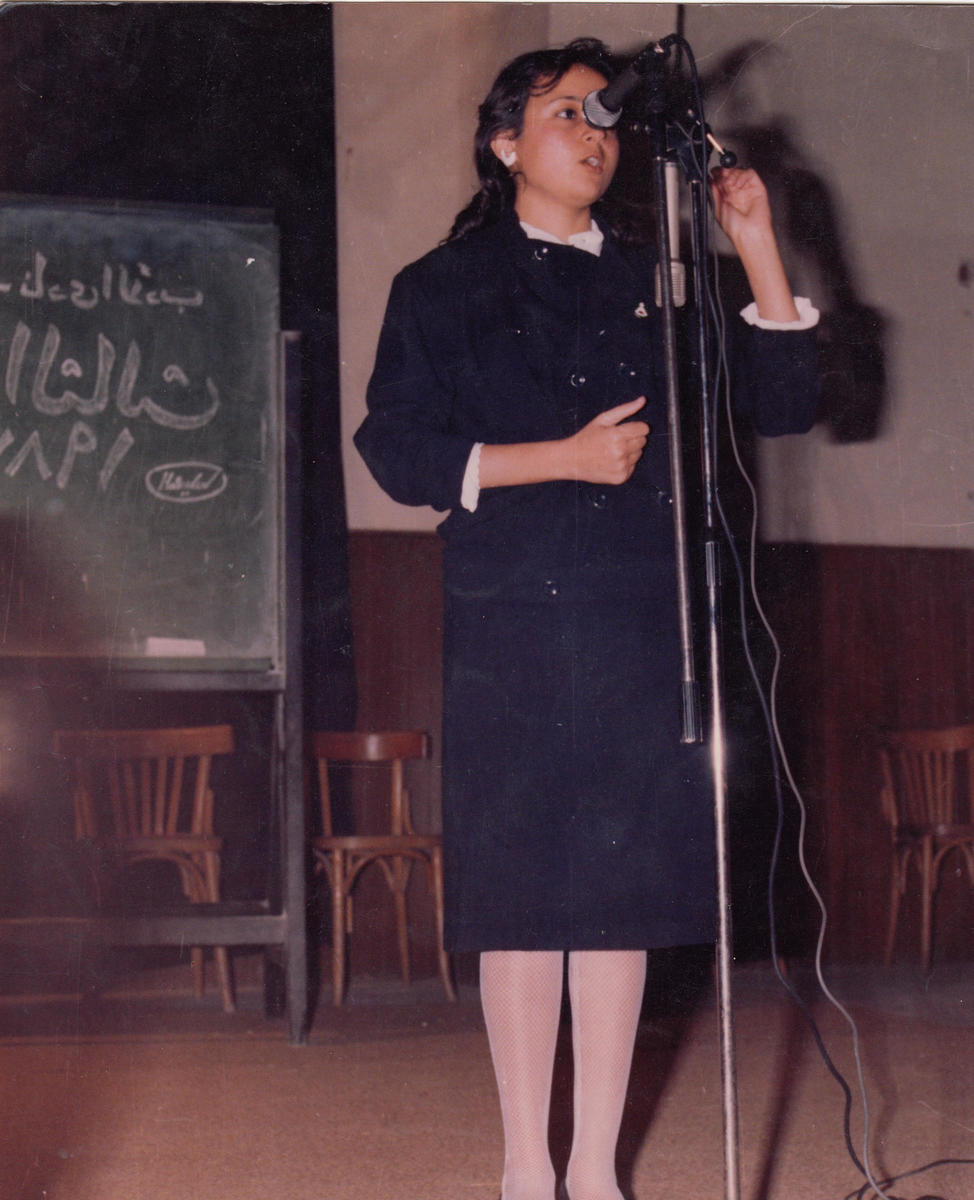
Once upon a time in the history of Arabic, the word qamus meant “ocean.” Unlike bahr, “sea,” qamus implied an impossible, merciless distance. What it named was not a specific, bounded body of water but the font of all seas encircling the earth — what the Greeks called okeanos, from which both qamus and the English word “ocean” derive. Perhaps it was this association with overwhelming expanse that led the 14th-century writer al-Fairuzabadi to title his magnum opus, a dictionary of the Arabic language, al-Qamus al-Muhit, “The Encompassing Ocean.” Today, qamus is the generic term for a dictionary, Fairuzabadi’s poetic license taken for granted. Yet a whiff of the endless ocean still clings to the word, especially for the poets.
One way to approach the vibrant and diverse oeuvre of the writer Iman Mersal, born 1966 in Mit Adlan, Egypt, and the way she has revolutionized Arabic poetry is by rescuing this double sense of qamus. Language, in Mersal’s work, appears as a series of lexicons that correspond to different journeys, to diverse spaces of crossing. This thematic comes into view most clearly in poems that deal explicitly with immigration — a “familiar” crossing which Mersal treats in a humane yet unsentimental manner — from Alternative Geography (2006) and Until I Give Up the Idea of Home (2013), books published well after her own relocation to North America. But it is not without precedent in A Dark Alley Suitable for Learning to Dance (1995) and Walking as Long as Possible (1997), the irreverent collections that put her on the map.
As Robyn Creswell writes in his introduction to The Threshold (2022), which collects poems from these four books in stunning English translation, it is helpful to know about the recent history of Arabic poetry to appreciate the originality of Mersal’s work. She emerged onto the Cairo literary scene in the 1990s with stringently observed, at times mordantly funny poems about infidelity, grief, friendship, and political disillusionment — mundane subjects unsuited to poetry, at least in the eyes of the Men of Letters presiding over Egypt’s state-sponsored literary institutions. Crucially, Mersal explored these ostensibly unpoetic subjects with a verse form that had, since its emergence at the dawn of the 1960s, been both laureled and reviled as a revolt against the Arabic literary tradition: the prose poem (qasidat al-nathr). As practiced by avant-gardists like Adonis — not coincidentally, the subject of Mersal’s Master’s thesis at Cairo University — the prose poets eschewed the rhyme, internal rhythms, and hermetic metaphors of classical Arabic poetry, as well as the Arab nationalist vision of the poet as the voice of the Arab umma. Mersal’s scrupulous specificity made the prose poem truly prosaic. As Creswell expressed to me, “hers was a voice — defiant, vulnerable, caustic, self-critical, street-smart, austere — they simply hadn’t encountered before.”
Although her style is conversational, it is important to insist that Mersal is not a vernacular poet. She writes in fusha, Modern Standard Arabic, even if her lexicons draw from the “ordinary language” of everyday life. As for companionship, Mersal relies on a makeshift canon of literary outsiders — Adrienne Rich, Milan Kundera, Sargon Boulos, and Waguih Ghali, among others — in her pursuit of candor, precision, irony, and depth. She is the master of a particular kind of volta in which a turn of phrase becomes a concrete image, abstraction or fantasy thudding boldly down to earth. “It’s true,” she writes in the titular poem of The Threshold,
we were about to nail down our relationship to metaphysics
when one of us began covering his skull
with an elaborate hat
making us all look like tourists
In the past decade, Mersal has increasingly focused on creative nonfiction. How to Mend: Motherhood and Its Ghosts (2016; English translation by Robin Moger, 2018) assays the unsung agonisms and ambiguities of the relationship between mother and child. (Mersal, who has two sons, lost her own mother at the age of 7.) Traces of Enayat (2019; 2023), explores another facet of her attention to the idea of inheritance. In the early 1990s, Mersal chanced upon an obscure novel, Love and Silence (1967), in a Cairo used bookstore. She was haunted by the book and by the story of its author, a forgotten writer named Enayat al-Zayyat who committed suicide in 1963, aged 26. Decades later, Mersal retraced her footsteps, discovering in the minutiae of al-Zayyat’s life, early death, and posthumous literary career many of the same forces that have surreptitiously structured Mersal’s own experience of the world. In any case, this archival turn should not be surprising. The same animating conviction — that any interest in the past begins with a burning question in the present — has always pulsed through Mersal’s poetry.
Mersal and I spoke on Zoom, an easy and enjoyable conversation. Speaking with her, one quickly gets the sense that she cares very little about cultivating personal mythologies. Mersal often takes a drag on her cigarette while listening, and chuckles to herself before speaking. (Sometimes, in an act of what I consider to be true intellectual generosity, she will let you in on the source of her private amusement.) She is warm and disarmingly funny, especially when evoking the numbing formality of life in Western Canada, where she has lived and taught since 1999. “How much more distance between people can there be?” she once joked, about COVID-era social distancing regulations. In the poem, “Why Did She Come,” the narrator observes:
It’s hard to meet a classical Communist here,
where clocks hang in government offices
rather than pictures of the president…
Nothing here deserves your rebellion.
In Mersal’s writing, humor serves as a sign of life and of the insistence — stubborn, courageous — to bear witness to any situation without sacralizing it.
—Maru Pabón
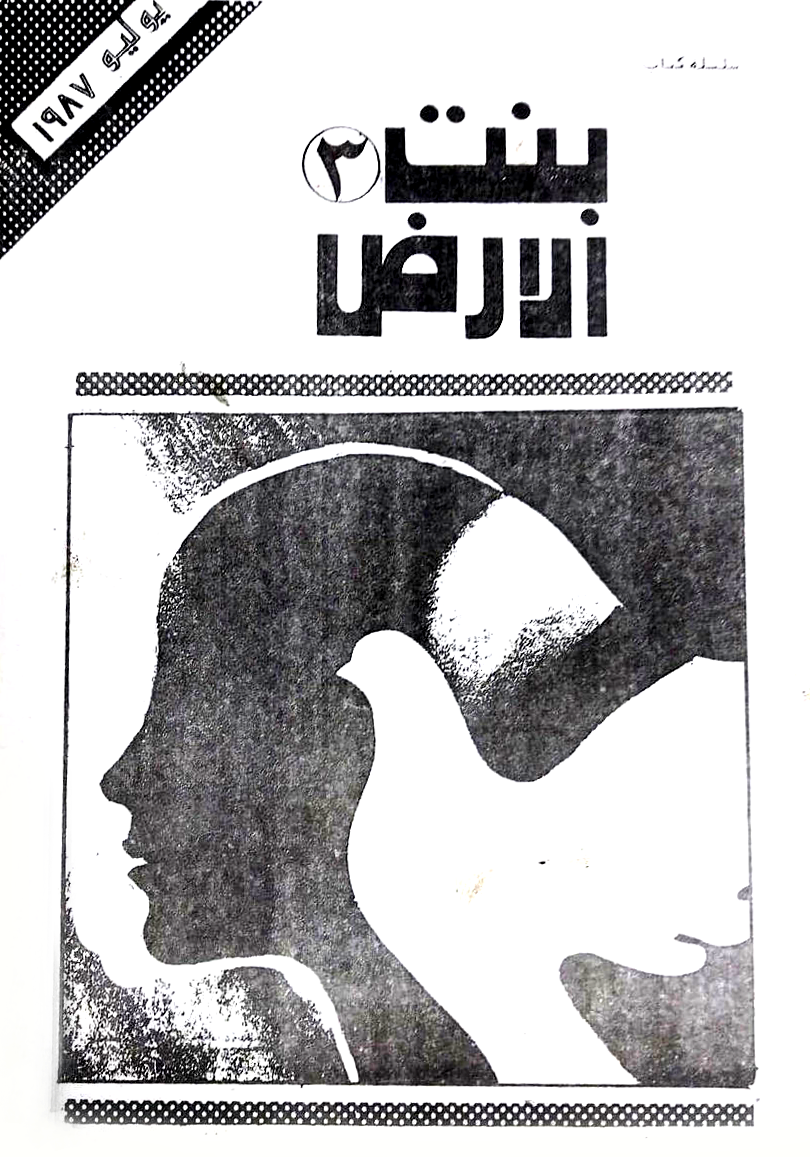
Maru Pabón: What are your first memories of language — of language as something you wanted to play or work with?
Iman Mersal: I did not grow up in a household where books were read to children. In fact, other than the Qur’an, our house contained no books. My interest in language came from the surrounding orality: listening to elderly women as they talked, the proverbs they used, their stories. Or memorizing chapters from the Qur’an at an early age in the village kuttab, which was my first realization of a language other than everyday colloquial. I was fascinated, too, by the radio, with its songs and audio dramas. I found the voices comforting, even when I didn’t understand. I would always ask adults about the meaning of this word or that — I remember hearing the word qashib on the radio and rushing to ask my mother about it, but she didn’t know it. Later I learned that it means “new” or “clean,” like jadid, and I found it amazing that a word can have synonyms! [Laughter]
MP: That primal scene of listening to the radio, hungering after words.
IM: The radio was always on. There was a whole station called al-Barnamaj al-Thani, the Second Programme, which produced its own plays, drawing on literature from all over the world. For example, I remember learning about Shakespeare, because they did Othello… Tennessee Williams, too. As a child in the village, I heard all these famous works as radio plays in Arabic. I recognized them, many years later, when I read them.
MP: So how did you make the transition to the written word? Do you remember your first book? Besides the Qur’an, I guess…
IM: I do remember my first book. In my paternal grandfather’s house, there was a room that had a cabinet with a copy of the Qur’an on top. My grandfather was painting this room, so he had to move everything out and I found a book that was hidden behind the Qur’an. As a four-year-old, I thought that it must be a holy book, too. It was full of beautiful illustrations. So I took it, and since no one asked about it, I considered it mine. Later on, I found out that my first book was entitled Tarbiat al-tuyur al-rumiya, Raising Turkeys. It was published in Kafr El Sheikh, another city in the Egyptian Delta, by a very small publishing house called Dar El Aitam (Orphans’ House) and written by a man named Abdel Muhsin Sabāh, who had studied agriculture in London. How this book landed on my grandfather’s cabinet in the first place is a mystery, since he was illiterate. But this book became one of my favorites, up until today. It is a how-to manual for Egyptian farmers, aiming to teach them everything about how to raise turkeys: how to take care of the eggs, increase production, protect the poults from disease, etc. I still have it.
MP: Amazing.
IM: So in our house there was the Qur’an and Raising Turkeys. And also, from time to time, a women’s magazine called Hawaa (Eve). There was a mystery in my youth, because the women in my family, my mother and aunts — the way they dressed was like women in the movies. And yet we lived in this little village — not rural, exactly, but small and lacking any public space besides the mosque. Looking back on it, I didn’t understand how they had been able to access this kind of modernity. The answer turned out to be Hawaa. Each issue had photographs of famous actresses in beautiful dresses, along with articles about health and cooking. And in the middle of the magazine, there was a pattern that you could use to make a dress like in the photos.
It wasn’t until I began attending the village primary school that I had things to read. I found a treasure in its small library, mainly prophets’ biographies and history books, reference books. I probably encountered my first dictionary there. Around that time, my father began to take me on trips to the city to buy books. Also, I was lucky to have a relative in medical school, a communist, who made it his duty to bring me books every time he visited. I remember him bringing me Tolstoy’s children’s stories, with illustrations… I had so many books for young readers from Dar al-Taqaddum and Dar Radogha, two Russian publishing houses that produced books in Arabic at affordable prices.
MP: In “The Threshold,” the title poem of Robyn Creswell’s collection of your poems, there is a wonderful sequence that hinges on the notion of a private dictionary, qāmūsī al-shakhṣī:
We didn’t panic when our money ran out
because one of us had become a Sufi
and after he offered up a short prayer
there opened beneath our feet — I swear to God —
a well full of beer
whereupon we behaved like people who’ve lost their minds
creating a private dictionary with words like
riwish
hinini
awaq
danasheen et cetera.
We screamed very loudly
and were understood by no one.
In your conversation with Lina Attalah for Mada Masr last year, you described your eager return to Cairo in February 2011, at the height of the protests — a few days before Mubarak’s resignation, it turned out — and an experience you had at a sit-in at Tahrir Square, a certain loneliness you felt from not understanding the language of the protestors: “There was a gap in my personal dictionary [qāmūsī al-shakhṣī] that had grown while I was absent.”
The image of a private or personal dictionary appears often in your writing. What does it mean for you?
IM: Well, a private dictionary could be a dream project for a writer. But that image in “The Threshold,” of poets drunk with words, screaming in public yet understood by no one, was based on reality. In the first half of the 1990s my young poet friends and I were obsessed with the idea of creating our own language. It was born out of a fascination with words and our discomfort with the language of power. We would sit around in cafés and bars in downtown Cairo — places like Le Grillon or Estoril — inventing words, carrying on conversations that others couldn’t understand. Some of us were better at creating these sorts of words, like Yasser Abdellatif and Ahmad Yamani. Those words in the poem are representative — riwish meant “cool,” hinini was “sex,” awaq was “impossible.” So, this image of the private dictionary expressed our alienation from society at large. It captures for me the moment of the 90s, when I was a young female poet hanging out with other poets of my generation — mostly male, of course — feeling isolated from society but also scared to confront it.
MP: You’ve written about this 90s moment as one of, exactly, alienation from the more traditional forms of political and cultural life in Egypt, whether the political party, the nation, or the literary establishment. What were some of the spaces that emerged outside of these forms — like the magazine Bint al-Ard, for example?
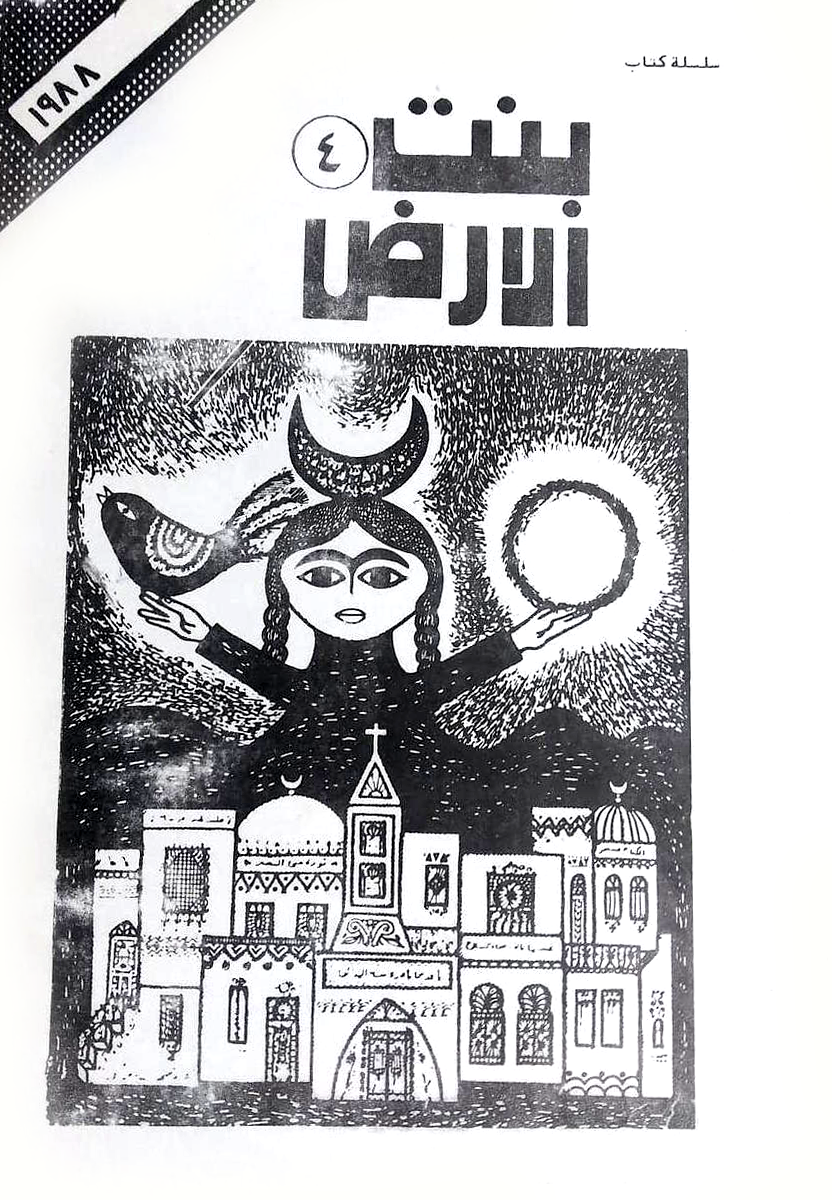
IM: Bint al-Ard actually belongs to an earlier moment, a different time and place; it does not belong to my 90s. The magazine was founded in 1984 by two young women in Mansoura, I joined them a year later during my first year at university. They were a little older — they had graduated from the engineering school and were still living in the city, while I was an undergraduate, studying Arabic literature. We were all interested in communism, feminism, and activism, and although most of our work was focused on making the magazine itself, we did a lot of community outreach. There were so many interesting events that we organized, bringing visitors to the campus to speak to students. On one occasion, when Angela Davis was in Cairo, invited by Nawal El Saadawi, the Bint al-Ard girls invited Davis to Mansoura and she came and spent a whole day in Kafr El Baz village, seeing how people lived. She was very genuine.
MP: What was the magazine like?
IM: We published big, heavily researched articles on subjects like family law — divorce and child custody and the struggles around that. We were interested in understanding different discourses about collective identities, social classes, and the position of women in society. For me, at that time, this was fascinating. There was a real desire to reach out and understand things. We would design our own surveys — write the questions and then go out and interview female students at university and collect the answers and then write up the results in the magazine.
Eight issues were published between 1985 and 1993; I was very involved from the third issue. The production quality improved over time, but it was always very simple. The covers were reproductions of paintings by Egyptian artists.
MP: What sort of things did you write for Bint al-Ard, yourself? Were you contributing poems to the magazine?
IM: Not really. Maybe once? I was already publishing poems in good literary magazines in Cairo, so I didn’t need a venue. But for example, I did a sort of travel diary. In 1992 I went to Iraq on a solidarity mission with a group of women from NGOs around the world; our Egyptian contingent included Amina Rachid. On my way home I visited the Baqa’a camp in Jordan, one of the largest Palestinian refugee camps. That piece appeared in the final issue of the magazine. I loved doing this kind of writing. It’s something I would like to return to, one of these days.
With Bint al-Ard, I felt that I was part of something bigger than myself — we were young intellectuals, and one day, we would change the world. I still felt that way in 1988, the year I graduated and settled in Cairo. In fact, when I moved to Cairo I was known as a girl from Bint al-Ard. Unless you were interested in poetry, that was how you would know me.
MP: So what changed for you and the others of your generation? What happened, to create your 90s?
IM: I would say that this intellectual spirit, which had long existed in Egypt and other postcolonial countries, was challenged — broken, even — by events. The Iraqi invasion of Kuwait in August 1990, followed by Egypt and the other Arab states allying with America in destroying Iraq, made the rhetoric of Arab nationalism seem especially hollow. The collapse of the Soviet Union, which destabilized the dominant discourses of socialism and “committed literature.” The continuing Palestinian suffering. But also, just the glaring poverty, injustice, and hypocrisy in Cairo. As young writers, too, we were confronted with the insularity of the literary scene, which was controlled by government cultural institutions with their literary magazines and publishing houses and above all the old guard of writers, almost entirely men, who were telling us, “You’re crazy, what you’re writing isn’t poetry.” All of this made my friends and I grow very close to each other, as if we were forming an alternative society. We founded our own independent magazines, like al-Jarād, “The Locusts,” — and developed our own conception of poetry.
MP: Yes, the prose poem. What openings did the prose poem represent for you and your friends? And how did the prose poem debates of the 1990s compare to those of the 1960s?
IM: I would say that while we read and admired the prose poem (qasidat al-nathr) that emerged out of Beirut’s literary scene in the 1960s — the so-called Shi’r generation of poets, led by Yusuf al-Khal (1917-1987), Adonis (1930- ) and Unsi al-Hajj (1937-2014) — we did not align our writing with this style. What was most important for the 90s generation was our abandonment of the grand metaphors and intertextual connections favored by the older generation, the obsession with ancient civilizations, whether Babylonian, Phoenician, or Egyptian. We were not at all interested in such things. We were striving to capture what was at once ordinary and ineffable. Both our themes and our approach to language were completely different.
I didn’t think about it this way at the time, but I now think that the 90s debate about prose poetry or free verse — Sargon Boulous, an older poet whose work was inspiring to us, referred to the poems he was writing in those years as free verse — was not actually about poetry. It was a political debate. Those who were strongly against it held to the notion that an Arab poet had to be a public intellectual — a prophet with a vision, contributing to the formation of nations and collective identities, speaking out against colonialism, religious conservatism, poverty, dictatorship — otherwise they were not a poet.
MP: In an essay on the poet Sania Saleh, a lost writer from the 60s — the sister of the literary critic Khalida Saeed, who was also Adonis’s wife — you describe her as “an individual voice, unique amid poetic ostentation… hemmed round by prophets, heroes, martyrs and leaders.” One thing that strikes me about your work is its aversion to grandiosity — and, conversely, its insistence on reaching for the specific, for whatever cannot be said otherwise. Robyn Creswell mentioned that during your many conversations while he was translating your poems, you would often insist on “the form of prose,” its “economy, its precision, and severe demands.” Could you say more about the kind of discipline or quality of attention that working with prose poetry, if we want to stick with that term, has entailed for you? And how that is manifested in the process of translation?
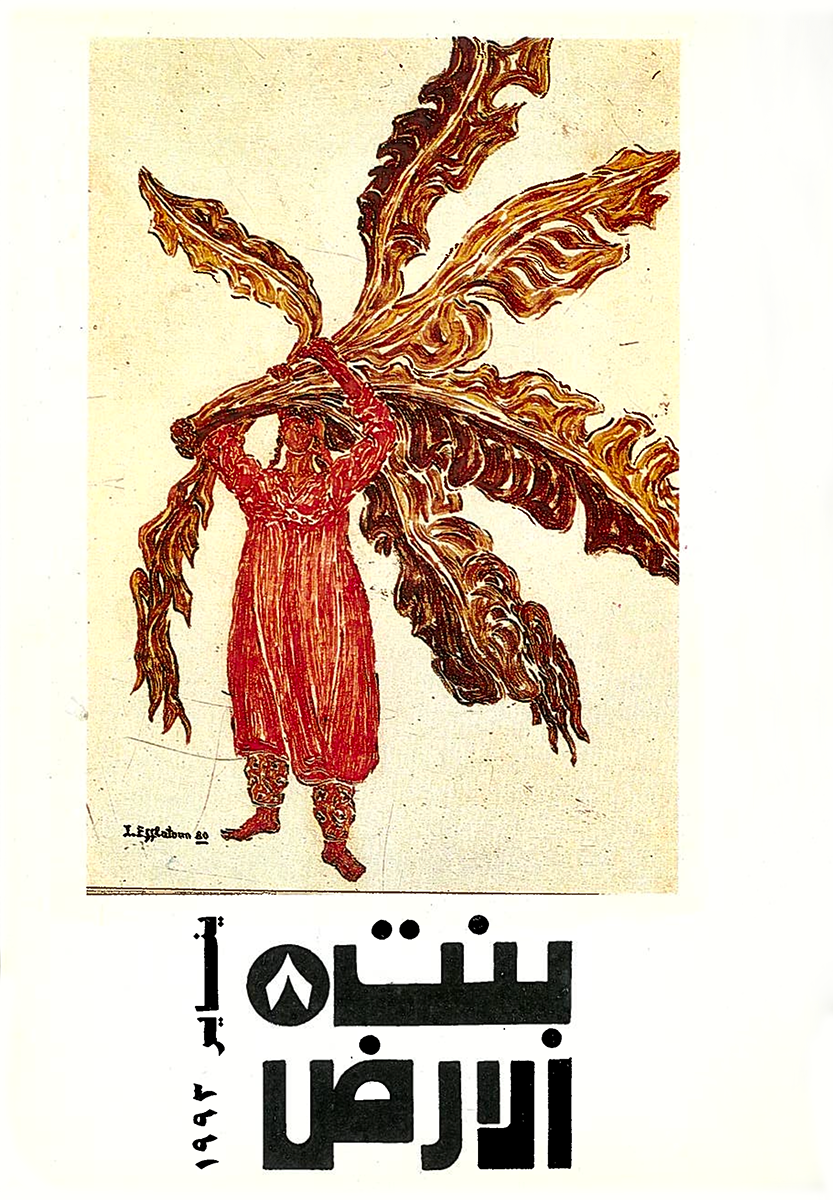
IM: Economy of language has always been very important to me. Lots of my conversations with Robyn revolved around concision — sometimes I’m even counting words! — and, exactly, specificity. Imagination deserves to be specific, but being specific requires a lot of effort from poet and translator alike, because I don’t mean this or that or that, either, and you have to keep going until you find it. Also, I love it when a poem has its own structure. Even if the poems in a book share similar themes or subjects, each one is like an individual creature; each has specific features. The breaks in a prose poem are both visual and syntactical. The body of the poem appears on the surface of the page, which it does not fully occupy because it has its own shape, arrangements, breaks, or simply “private spaces” — part of the poem’s personality. This poses another challenge for any translation, because sometimes in order to bring a poem into a different language, you have to break its structure.
MP: One of the things that I particularly admire about your work is that it belies the idea that the prosaic requires less discipline than, say, so-called hermetic poetry — as if prosaic or prose poetry did not entail a rigorous and specific engagement with the manifold possibilities of language.
IM: Thank you! I think with the prose poem or whatever name we give it… you have to go through a journey. I’ll give you an example. When I left Egypt, I did not write a single poem for five years. I was trying to learn English and reading Anglophone writers whose work I was already familiar with in Arabic translation, as well as writers from all over whose work was now available to me in English translation. And I quickly discovered that there were all these poems about two places — places, languages, cultures — always contrasting the Third World and the space that hosts the displaced author. I was feeling the exact same things about which I was reading, so I said: there’s no need for me to write something like this. It exists already, and it’s beautiful, so why should I add to this archive of nostalgic poems. It would be like grabbing the first fruit in the tree.
MP: The lowest-hanging fruit…
IM: Yes. It takes time to figure out your position. Who are you? Where are you? From what angle are you seeing what you’re writing about? I think this journey belongs to the prose poem.
MP: This may be a good moment to ask you about working with Robyn Creswell on The Threshold, which collects poems from four books, published in Arabic between 1995 and 2013. But this is actually the second anthology of your poems in English; there’s also These Are Not Oranges, My Love, which came out fifteen years ago. Could you speak to the differences between them?
IM: The origin of Oranges goes back to 1995. I was working as an editor at Adab wa Naqd, a leftist literary magazine, and one day I found, among the submissions, a few poems of mine, translated into English. No cover letter or anything — it must have been thrown away. Mysterious! Maybe a year later I met this poet visiting from the US who was very familiar with the literary scene in Cairo and who mentioned that he had, in fact, translated some of my poems. Ah! That was Khaled Mattawa. Khaled started with my earliest poems and continued to translate new poems of mine over the years, getting them published in literary magazines abroad, which eventually led to him doing These Are Not Oranges, My Love with Sheep Meadow Press in 2008. Khaled introduced my work to the English language, and I’m forever grateful to him.
With Robyn, it was a completely different story. He was of course grounded in modern Arabic literature, especially poetry, but he arrived at my work later. He set out to translate my most recent book of Arabic poems, Until I Give Up the Idea of Home, and then decided afterward to go back and translate poems from my earlier books, as well, which came together as The Threshold.
MP: Would you say that your relationship to translation has changed over time?
IM: I think that early on, when people first started publishing my work in other languages, I was more nervous about being translated than I am now. I’d feel like I was sinking if something were to be changed, so I would always insist that it keep closer to the original. But I’ve come to realize that the translator’s voice must be there as well, embedded somewhere. You have so many things to think about — language, culture, and gender — so you have to walk through the work together.
MP: I think sometimes we forget that it’s not only idioms and sayings that can be shibboleths, but so many other aspects of the identities we occupy.
IM: Absolutely. As for working on the poems with Robyn, it was a fantastic experience. I had lots of fun. I was often keen to push him on his reasons for choosing a particular word, or whether a sentence could be more economical [laughs], and he always replied with passion and patience, even when I was unable to clarify what exactly needed to be changed. As a translator myself, I know that when you carry a voice from one language to another, this voice must be made familiar, but also can also remain awkward and strange, sometimes. Poetry is wide enough to carry it all.
MP: Translation can be bewildering, in a good way. The words of everyday life can become foreign to you.
IM: Exactly. When you are discussing even a single word, it can become foreign. It came to you because it fit in a particular place at a particular time; you didn’t think twice about it. It came naturally, but now that you have to justify or explain it, it seems like a stranger. It’s a new relationship to your poem.
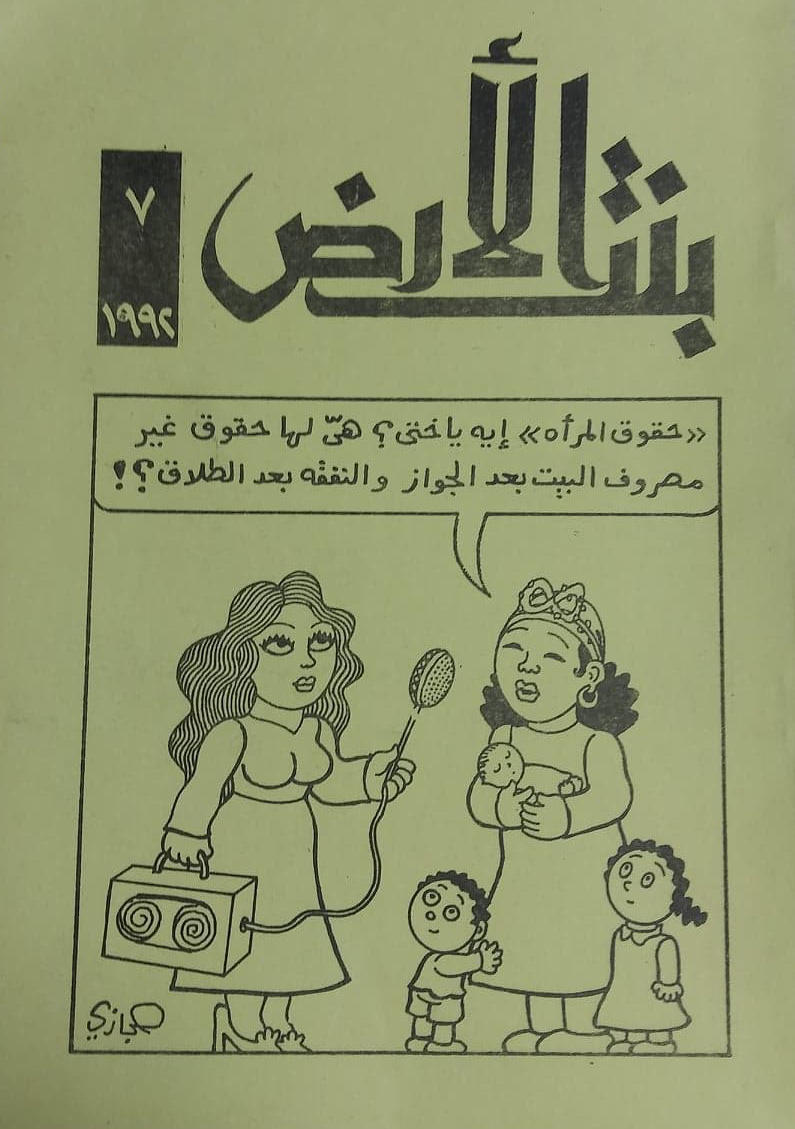
MP: Can we talk about your own work as a translator? I found it so interesting that you translated Beer in the Snooker Club, the only novel by the Egyptian writer Waguih Ghali, written in English and published in 1964. How did you encounter Ghali’s book? Was it part of your reading for your dissertation?
IM: No, but it was part of my reading to learn English. [Laughter] Before I decided to get a PhD. In 1998 we left Egypt and moved to Boston, where my husband is from; he was finishing his dissertation and I was working on my English, which was not very good. So I was taking English classes with Jewish immigrants in Coolidge Corner and reading on my own, including the works of Khalil Gibran, who had arrived in Boston a hundred years before I did. This was the period I was talking about earlier, when I was reading all of those poems about two places — poems of comparison and nostalgia, contrasting Bangladesh and London or whatever.
So one day I was sitting at a café on Newbury Street with a friend of mine, Michal Goldman — she made the film Umm Kulthum: A Voice Like Egypt (1996) — and she asked me how I was doing and I said that I felt I would not write any poetry ever again. Statement! [Laughter]
MP: You’d overdosed on diasporic writing…
IM: I just couldn’t imagine what even to write about. And Michal said, “I have to get you this novel, Beer in the Snooker Club. It’s by an Egyptian, Waguih Ghali, and I love it and I think you need to read it.” I had never heard this name before, never heard of this book. All of my life, I have been fascinated with people who are excluded for one reason or another, but this was new to me. Michal brought me the book the very next day, drove across town to bring it to me, and it was like this guy had deconstructed the discourse that was driving me crazy. He had been an outsider in both places, a diasporic misfit. And it really registered with me, like, “Okay, you don’t have to write poems about these raw feelings that everyone feels when they leave home.”
MP: So encountering that book was a sort of threshold event for you, even if it took a while for you to get back to poem-writing again?
IM: Very much so, yes. Waguih Ghali opened doors for me. And it became my dream to translate Beer in the Snooker Club into Arabic. I would be reading a passage from the book in English and I could picture it in my mind in Arabic without translating a sentence.
MP: Like a hallucination! And then it came true in 2013, when your translation of the novel was published in Egypt, in collaboration with Reem al-Rayes.
IM: Yes, but even before that, in 2006, I published what I think is the first nabza — a short bio, maybe one thousand words — about Waguih Ghali in Arabic. Until then, only Anglophone people were familiar with him — some of the writers who get translated into English knew about him, maybe — but no one ever thought about talking about him in Egypt. There was so much misinformation.
MP: It is crazy that it took almost fifty years for Beer in the Snooker Club to be translated and published in Egypt…
IM: Yes! But no crazier than Love and Silence, Enayat al-Zayyat’s novel, being out of print and unremembered for so long. There are cases like this all the time. I don’t think this interest in marginalized writers is based on any celebration of marginalization. It is more a question of what happens when a particular writer or writing fascinates us, and then we discover that it’s been marginalized.
MP: Of course. In thinking about your writing, nonfiction and poetry together, I’ve been struck by your preoccupation with that which escapes — images, history, language itself — but continues to mark our bodies, surroundings, and lives. One of the most important figures in the history of Arabic poetry is al atlal, the ruin or trace — the presence of absence. In How to Mend, your book on motherhood, you evoke another sort of trace, the ghost. And then with your latest book, Traces of Enayat, you follow the paths of this lost writer and her novel, which has haunted you for decades.
IM: I think that any interest in the past stems from an urgent question in the present. When it came to Enayat, the question I was pursuing was about individuality. Individuality in the 1950s and 60s, when she was coming of age as a writer, as well as the 1990s, when I first came upon her work. But individuality is more complicated than talking about oneself or showcasing someone’s life. Telling Enayat’s story involved tracing what shaped her life and death as well as how we can read it: her social class, her German education, the birth of psychiatric medicine in Egypt, the evolution of cultural institutions and creative circles from the time of Abdel Nasser to the present day. It is also a question about individuality and marginalization, since her novel remained out of modern Arabic literature canon for fifty years.
MP: It’s an incredible story — her story, of course, but also your own, as you pursue this question.
IM: Sometimes random things inspire you. Seriously! You may find yourself at a moment in your life when you’re feeling very out of place or isolated or depressed, unable to relate to anything you’re reading, and then you come across a book by chance that seems to be speaking directly to you. This is how I felt when I read Love and Silence in 1993. And when I started years later to search for Enayat, to retrace her footsteps, I discovered that my first residence in Cairo was just a few streets away from her house — where she lived, and where she committed suicide. I was actually very open to these kinds of coincidences. I considered them to be gifts, somehow. The geography of Cairo had so many odd intersections between the two of us, intersections that guided me during the writing process.
MP: This approach makes the book read like a literary detective novel! You do such a wonderful job at capturing the thrill of discovery, these moments of total serendipity.
One thing that I appreciate about your work between forms and genres is the way that certain images from your poems reappear in your nonfiction writing. In the 2007 poem “The Curse of Small Creatures,” which stages a return to your home village, Mit Adlan, you describe an acid-bleached photograph of a girl and her mother and inventory certain details, including that the mother will die 47 days after the photo is taken, that she is wearing a thick belt and wristwatch, which is broken. Then in How to Mend, you meditate on that image, which turns out to be the only photograph of you and your mother together, and you where you write in detail about your memories of that day, including the watch — your mother’s smile as she strapped it onto her wrist, a familiar smile that is nowhere in the photograph. Could you talk a little about moments like that, when you feel like you haven’t exhausted what you have to say about a particular image or memory?
IM: That photograph with my mother has occupied my imagination for years. I return to it in almost every poetry book I write. The curious thing was that I was never able to see her in that photo; she was unrecognizable to me. She looked like a ghost to me in her own photo, and I was never able to figure out why. But when I was working on the chapter on photography in How to Mend, I learned about a practice from the early years of the medium, when in order to get an infant to sit still long enough for the photographer to take the photograph, the child’s mother would sit with them, obscured by veils or draperies, creating an optical illusion in which the woman disappeared into the child. And this journey through the metaphor of the “hidden mother” in 19th century photography ended up helping me to recall more of the details of the day my mother and I went to the studio, things I could never remember — including the story behind the broken watch. For me, this goes back to the idea that you’re always pursuing a question, which you try to approach by every means available to you — reading, conversations with others with similar questions, writing. In whatever genre, or genres.
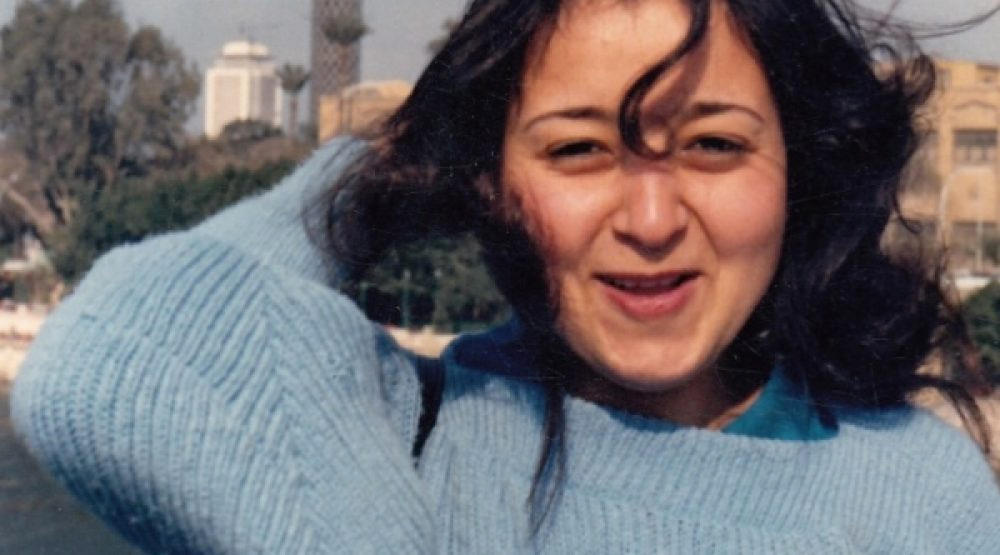
Traces of Enayat, Iman Mersal’s latest book, is available in bookstores in the UK and Europe and by post in print and digital from And Other Stories, everywhere else. The North American print edition, forthcoming from Transit Books in April 2024, is available for pre-order now.